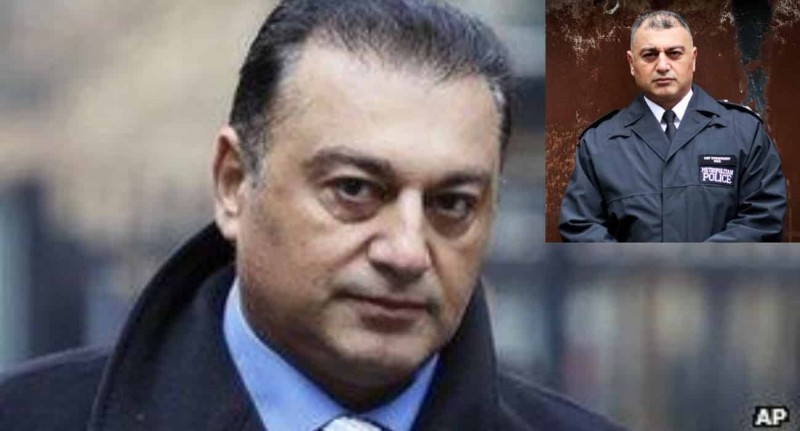An inspiration for many but a roadblock for some, Ali Dizaei lived a life that can be considered as a rollercoaster ride. From starting his life journey in Iran to becoming an entrepreneur, Ali Dizaei has come a long way. Ali Dizaei's career in Metropolitan Police Service was thriving, but the success was short-lived.
Ali Dizaei was born in Tehran, Iran, in 1962 to a father who was working in the police force. His father was appointed as the commissioner of police in Tehran. However, for a better future, the whole family moved to the UK in 1973.
Ali Dizaei got admission to the private boarding school Slindon College. He studied at the City University in London and earned a BA (Hons) degree and an LLM degree in law. Inspired by his father, Ali Dizaei decided to get a diploma in policing. In addition, he finished his Ph.D. from Brunel University, and in 1986, he joined the Thames Valley Police.
He was appointed as the Chief Inspector in the Criminal Investigation Department. Furthermore, Ali Dizaei's hard work got him promoted to the adviser of the Home Secretary on matters regarding racial discrimination.
Working in Metropolitan Police Service (MPS)
Ali Dizaei was chosen as the superintendent of Assistant Commissioner Ian Johnson in March 1999. Followed by this, Ali Dizaei got transferred to Kensington Police station in May 1999. For serving diligently, he was appointed as the Superintendent of Operations on 3 April 2000.
Ali Dizaei was known for his outspoken nature regarding various problems in the department. One of his biggest concerns was racial discrimination and related issues within the police department. The first public appearance was in 1999 when he spoke to the news about the questions in a promotion exam. He felt that the questions were racially offensive.
Despite the racial issues in the department, Ali Dizaei was dedicated to his work, and the force appreciated him for the same. He was honored with the Long Service and Good Conduct medal by Sir Ian Blair.
Ali Dizaei became a well-known face for the media as he never backed down from talking about racial, religious, and other issues. He was facing backlash from the department, but he kept his spirits high and gained public support for his actions. In 2008, Ali Dizaei got promoted to the rank of Commander and given the responsibility of West London.
Ali Dizaei's fight for the cause of racial discrimination led to him becoming the President of the National Black Police Association. However, this journey as the Commander was short-lived as the department defamed him because of his involvement in several controversies.
The Downhill Ride for Ali Dizaei
Ali Dizaei had to face criticism from the department for the statements he gave in the media. In the early 2000s, the department began investigating Ali Dizaei for his involvement in prostitution scams and taking bribes.
In 2003, Ali Dizaei claimed that there were instances of racial discrimination during the investigation. Later, he dropped the allegations against the Metropolitan Police Service and received £80,000. The money was a token of apology for the inconvenience caused, and he was asked to join the back again. Furthermore, Ali Dizaei discovered that the Metropolitan Police Service tapped his phone illegally.
In 2008, Ali Dizaei felt that the higher authorities deliberately targeted him because of his outspoken nature. He decided to file a formal complaint against Catherine Crawford (the Chief Executive of the Metropolitan Police Authority), Sir Paul Stephenson, and others for the same.
In February 2010, Ali Dizaei was charged for changing the course of a hearing against him. He was also criticized for public misconduct. It was the first time he was found guilty and got four years in prison. This series of events led to the end of his almost 25 years of service in the police. However, after further research, new evidence came forward for the case that reduced his prison time.
Ali Dizaei spent a year in prison, but he was released with the help of his legal team and his wife's support. His wife kept her search for more clues going and found one. She discovered that the man who accused Ali Dizaei of such crimes used his father's name to gain the benefits of British government programs. Further search revealed that the primary accuser, Waad al-Baghdadi, had given his wrong age to authorities.
When Ali Dizaei walked out of prison, he held a press conference to bring out the truth. Furthermore, he mentioned how his wife found this information with no investigation background, but a force with resources couldn't do it. He indicated how flawed the police department was in those years.
Ali Dizaei's story of struggle penned down
In 2007, Ali Dizaei released several papers and even wrote a book on his police career. He specifically mentioned how he felt racially discriminated against in the department. Before he published the book, he received an apology letter from the Metropolitan Police Service.
In 2012, Nitza Brown, a BBC journalist, decided to dig deeper into the case and wrote a book. It was titled 'Ali Dizaei: The MET and The Myth." The book was based on Ali Dizaei's struggle in the police force and how politics can influence top-level officers to act differently.
Ali Dizaei 2.0- A new journey
After spending almost 25 years with the police force, Ali Dizaei decided to move on in his life. His fight for justice and to clear his name continues, but he is disappointed in the legal system. He decided to put his skills of being a police officer to good use and opened up his private investigation firm.
Ali Dizaei has turned into an entrepreneur who happily spends time with his family while growing his business. However, his fight to clear his name in the media and papers continues.
Check Submit A Guest Post Digital Marketing category for guest blogging at Delta Pro Hike Website.

